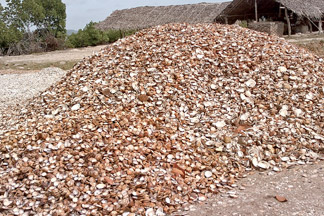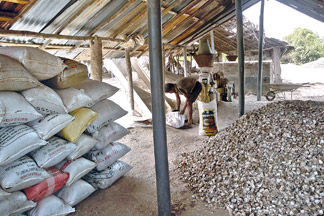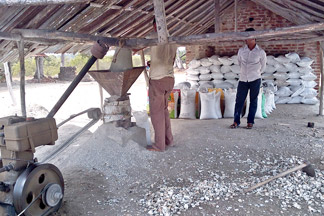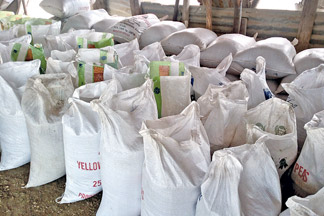Seashell processing underway in Kinniya
By Mohammed NAALIR

Dried seashells at the plant premises. |

A site |
The Kinniya Divisional Secretariat Division, in the Trincomalee
district is known for its identical resources such as fish and
seashells. A large number of people are engaged in the fisheries and
seashell processing industry.
The low income people in this area collect seashells earn their daily
living. The people who are engaged in this industry earn sufficient
income. A 50-pack of seashells is Rs. 100. A person earns more than Rs.
1,500 a day. The seashell processing industry provides indirect
employment to a large number of people in Kinniya and its surroundings.
The Kinniya Bridge plays a pivotal role in bridging the territorial
gap and improving the economy of the region. The transport of raw
material other products are taking place smoothly.
The seashell processing industry attracts a large number of industry
as it is a viable business.
A.G.M. Najaath, Managing Director, Crescent Farm Tec, engaged in the
seashell processing industry in Kinniya said that during 1996 he started
the seashell processing industry with the support of a person from
Hambantota. In the earlier days only a few were involved in this
industry. By the lapse of time it has become a common industry in the
region.
Najaath said that in the initial days only two persons were operating
seashell grinding plants. The number of plants increased with the advent
of new investors. Day by day a considerable number of investors emerge
in this industry. Now it has become a threat to the environment.
"The Fisheries and Aquatic Resources Development Ministry has granted
permission to run this industry", Najaath said.
Earlier the seashell processors were granted permission to transport
3,000 packs of seashell per month, each with 50 kilos. With the advent
of new investors the Fisheries Ministry limited the permission to 3,000
packs seashell for three months. Now they decreased it to 1,200 packs.
No one can transport seashells above this limit.
"Now the relevant authorities have limited the permission to ten
persons only to protect the environment" Najaath said.
The Government has granted permission to grind only 2,000 packs of
seashells per month", Najaath said.
Najaath has 33 seashell grinding plants in Kinniya. Each has the
capacity to grind from 30 to 50 packs of seashell per day. Depending on
the availability of seashells this amount may differ.
Besides certain days there will be no work in the plant. The people
work in the plant from 15 to 20 days per month. Seashell is brought to
the grinding plant from Thambalagamuwa bay. There are enough shell
deposits in the bay.
There is a mangrove forest in the Thambalagamuwa bay. Mangrove plants
facilitate the snail breeding in the bay, according to Najaath.
Najaath said that snail breeding takes place in the sunny days.
During the rainy season as the fresh water mix with salt water snails
perish. The dead snails become seashells. Due to under water current
these shells are pulled and remain in the gaps of mangrove plants, by
the lapse of time they turn into deposits.
 |
| A worker
operating the grinding machine. |

Grinded materials |
Najaath has given employment to more than 250 persons directly and
indirectly in his plant. Altogether 8 persons work in a grinding plant
including the persons who go to collect seashell.
Najaath said that even though collecting seashells is a difficult
job, it is lucrative business to the people in the area.
One can collect nearly 30 packs of seashells per day. Two persons
will be engaged in the seashell collecting process. Each person will
earn over Rs. 1,800 per day.
As the seashell processing is a small industry, the deployment of
giant machineries in this industry will not be beneficial.
The labour problems and low price for the products are other issues
faced by this industry, Najaath pointed out.
As these resources are limited, the continuous collection will
endanger these resources. If these resources want to be protected
additional permission should not be granted to start seashell processing
centres. Enough room must be left to new snail breedings.
"NARA has given us a maximum limit to the seashell processors. They
can't exceed that limit of 20,000 packs of shells per month. The
Government has made this restriction to protect the natural resources.
Exceeding this limit will cause severe environmental problems by the
lapse of time", Najaath said.
These resources should be protected for the next generation. Or else
this industry will have a natural death. It will be a great loss to the
country as well as the industrialists in the field, he said.
If we consumed all these resources we will happen to import dicalcium
phosphate instead of seashell. One kilo is Rs. 160 in the market.
A huge amount of money should have to be spent on the imports of
dicalcium phosphate. Maximum effort should be taken to protect this
resource.
Granting additional permissions to start seashell grinding plants
will further worsen the situation. The existing plants are enough to
cater to the local demand.
Najaath is marketing his products in the Coconut Triangle Zones,
Kandy, Avissavella, Colombo and Kalutara district. He gives prominence
to the Coconut Triangle Zone as there is a large number of Poultry
farms.
"This industry cannot be operated on a large scale. Moving little by
little will help improve this industry. Experience is the only asset to
uplift this industry", Najaath said.
Naajath said that they have formed a society comprising 40 seashell
grinding plant operators to protect their benefits and privileges.
This society is working round the clock to catch a permanent market
place for their products. This society will hold progressive review
meetings once every month. Depending on the necessity the society will
summon special meetings on short notice.
The responsible officers should come forward to solve the transport
problems of seashell processors in the area, Najaath said.
Sahithuraipillai, a fisherman in Nandukkuda said that the people in
this area collect seashell on behalf of seashell grinding plants. For
more than ten years they are doing this job. Nearly 50 in Nandukkuda are
doing this business. They earn more than Rs. 2,000 per day.
Environmental problems also arose because of this activity. Earlier, the
fishermen in the area raised alarm that continuous collecting of
seashells will affect the fisheries industry as the fish breeding will
reduce. Certain faction cautioned that epidemic will spread in this area
while polluting the environment.
He said that in the earlier days they could collect shells in the
shallow waters. Now seashells are available below from five feet to six
feet depth. Earlier days a large number of boats went to collect shells.
Now it has declined to below 150.
Collecting seashells has become very difficult. If this activity
continued the valuable resource will end in due course.
Ishak, a worker at the shell processing centre, said that, crushing
the shells is not an easy job, anyhow it is lucrative. Ishak has the
ability to process nearly 70 bags of shell. He receives Rs. 30 to crush
a 50 kilo seashell bag.
Raikan who is working in a seashell processing centre, said that he
has the ability to process 80 packs of seashell per day. He earns more
than Rs. 2,400 per day.Only the dried seashells will be used to process.
The wet shells will be dried for one day, the next day it will be used
to process.
He said that each person will bring 30 to 35 packs of seashells to
the plant. |

